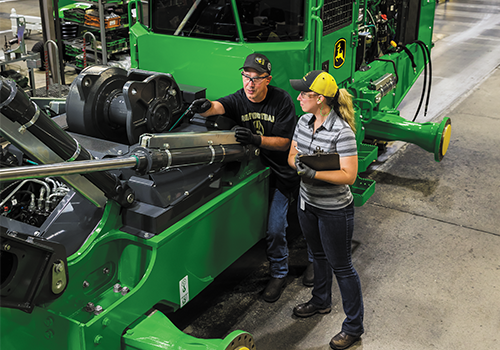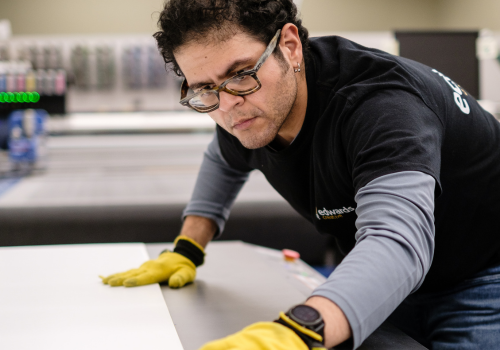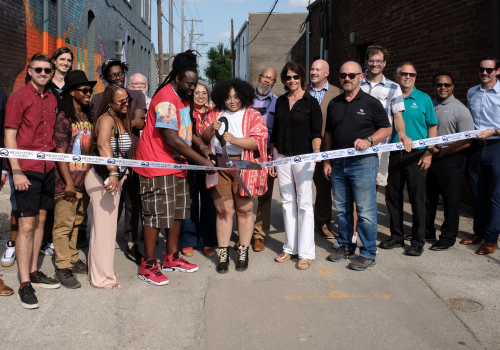QC, that’s where our love of nature is good for business & all who live here

QC, that’s where environmental stewardship isn’t a trend – it’s a value on full display in our lush landscapes, crisp air, clean waterways and overflowing recycle bins. It is where Midland Davis Corp. sparked the QC’s recycling revolution – starting in 1892. And where conserving the environment and protecting shared resources is part of everyday best practices for QC-headquartered West Liberty Foods.
QC, that’s where MetroLINK is leading in sustainable transit technology and carries workers to jobs, children to school and shoppers to stores on a 100% eco-friendly fleet. It is where travelers enjoy covered parking at the Quad Cities International Airport, fully protected beneath a solar array. It's where the founder of Living Lands & Waters was raised and sparked the world to respect and honor our creeks and rivers. It is where an EPA-declared Superfund Site was reclaimed by the community and became Nahant Marsh Education Center - a remarkable natural playground we get to explore.
West Liberty Foods
Rooted in the rich agricultural traditions of Iowa, West Liberty Foods spent decades growing its business and its commitment to improved stewardship and sustainability. It is a leader in animal health and welfare, food safety, employee well-being, community outreach and environmental impact.

A founding member of the Iowa Sustainable Business Forum, West Liberty Foods is a regional and national thought leader eager to share best practices and connections. “I talk to organizations all the time and get asked by businesses to come look around and show them what they can recycle,” said Michele Boney, Director of Sustainability, West Liberty Foods. “We’ve even had some of our competitors come into our facilities to see what and how we are recycling. We believe these are things we should not keep secret, but share widely with everyone,” she said.
West Liberty Foods redirects its waste to recycling, composting and waste-to-energy incineration that also gets re-recycled. The company feels it has an unwavering responsibility to reduce its environmental impact and knows it is the right thing to do, Boney said. “A lot of people don't look at garbage as a cost to them; they say it is just the cost of doing business,” she said. While businesses know exactly how much product they are shipping out, they may not realize how full the compactor is behind their building and the cost of adding that waste to the landfill.

All four of West Liberty Foods’ manufacturing plants are ISO 14001 certified, demonstrating its commitment to continuously improve systems in place to safeguard the environment. The company is setting new targets to decrease energy and water usage, and greenhouse gas emissions.
“I believe there will be continuous improvement and innovation. There will always be something new to try and if it can reduce greenhouse gas emissions or just the need for gas or diesel fuel, we’ve got to try it,” Boney said. “Anything we can do to advance sustainability benefits the entire world.”
Midland Davis Corp.
QC, that’s where a company founded in 1892 continues to influence our culture of environmental values and action. Founded in the QC, Midland Davis Corp. is safeguarding our natural and man-made resources by collecting, brokering and coordinating logistics for materials that would otherwise be dumped into a landfill.
Midland Davis recycles ferrous and non-ferrous scrap metals, paper, plastics and wood for businesses and residents. The goal is reuse and zero waste. Everything it collects is given new life.
 Scrap wood is grinded on-site into garden mulch as well as boiler fuel that keeps a local greenhouse growing throughout the winter. Metals are sold and delivered to mills and manufacturers across the U.S. who melt and mold it into new parts. Old cardboard boxes and printing scrap are shipped out to paper plants, mushed into pulp and reborn into usable product once again.
Scrap wood is grinded on-site into garden mulch as well as boiler fuel that keeps a local greenhouse growing throughout the winter. Metals are sold and delivered to mills and manufacturers across the U.S. who melt and mold it into new parts. Old cardboard boxes and printing scrap are shipped out to paper plants, mushed into pulp and reborn into usable product once again.
Nothing is wasted. A riding lawn mower someone dropped off as scrap now keeps the grass trimmed at one of Midland’s locations. The company used metal from its collection yard to build a small addition, as well as custom tables and equipment for its newest division. “Even when we grind wood, we have a magnet that pulls any nails and screws out and those go to a steel mill. Yes, zero waste,” said Eric Davis, the company’s Business Development Manager.
He and his siblings, Laura Davis, Controller, and Michael Davis, Human Resources Manager, grew up in the region and ‘boomeranged’ back. Someday, they will be the fifth generation to lead the company.
 “None of us were forced to move back to the QC and work in the family businesses; we all chose to and part of that is the region’s connectedness and environmental values. That is important to us. We are all here now working in the family company because it helps benefit the community we grew up in,” Laura Davis said.
“None of us were forced to move back to the QC and work in the family businesses; we all chose to and part of that is the region’s connectedness and environmental values. That is important to us. We are all here now working in the family company because it helps benefit the community we grew up in,” Laura Davis said.
Zero-waste is a QC ethos established long ago and one Midland Davis will always strive to expand, providing businesses with cardboard compactors, recycling bins and trailers, picking up metals, providing curbside recycling, a scrap drop-off site and recently launched a wood pallet refurbishing division. “We can help a business make some money while reducing their landfill costs and at the same time, help the Earth,” Eric Davis said.
“I like that our family business is one that has a positive impact on the environment,” Laura Davis said. “This is our planet, and it is the only one we have. We must take care of it and we are all doing our part in trying to extend our limited resources. People here really do feel they have a responsibility to do things that are sustainable, ecological and for the good of the planet.”
Nahant Marsh Education Center
QC, that’s where we’ve restitched a 325-acre tapestry of thriving landscapes – marsh, wet and sand prairie, bottomland forest – on land within an industrial park that once was poisoned by lead. It’s where community organizations and volunteers worked tirelessly for its rebirth and continue to nurture and value this natural playground known as the Nahant Marsh preserve.
It’s where you can challenge yourself to a treasure hunt to identify the 11,000+ species of animals and plants that live on these grounds, walk trails under tree canopies outlined by prairie grasses, watch river otters and muskrats glide in open water and feel the prickly skin of the Midwest cactus that grows in the sand.
 “Nahant Marsh is a real QC treasure. We are surrounded by an industrial park and look at everything that is thriving here,” said Brian Ritter, Executive Director, Nahant Marsh Education Center. It is a wetland ecosystem critical for habitat, clean water and flood mitigation for the Mississippi and Rock Rivers. And its accessibility – just off I-280 – is an invitation for everyone to stop and explore.
“Nahant Marsh is a real QC treasure. We are surrounded by an industrial park and look at everything that is thriving here,” said Brian Ritter, Executive Director, Nahant Marsh Education Center. It is a wetland ecosystem critical for habitat, clean water and flood mitigation for the Mississippi and Rock Rivers. And its accessibility – just off I-280 – is an invitation for everyone to stop and explore.
Ritter has spent the past 15 years leading the rebirth of the wetland habitat and growing its footprint. “My grandparents had 30-acre farm in Bettendorf and as a kid, I got to be an explorer of that land. It was a great way to grow up and that is where my passion for this work was born. I want to see the next generation of kids have the same experiences I did, to come to a place like this and learn about the natural world in a perfect setting, not from a textbook or online; but actually experiencing it,” he said.
It is a mission the QC region shares, illustrated by its 350 volunteers – residents, companies, and children as young as six – who help collect prairie seeds, pull invasive plants, clear brush and more. “There is a real sense of responsibility in this region for caring for the natural environment,” he added.
 Nahant’s volunteer coordinator Kelsi Massengale agrees. “There is a focus on sustainability in the QC, a consideration given to what we are building, how we are growing, visual aesthetics and accessibility to nature,” she said. The region is flush with preserves and city, county and urban parks with mountain bike and horseback trails, lush growing gardens and wide open land to run, play or watch a meteor shower.
Nahant’s volunteer coordinator Kelsi Massengale agrees. “There is a focus on sustainability in the QC, a consideration given to what we are building, how we are growing, visual aesthetics and accessibility to nature,” she said. The region is flush with preserves and city, county and urban parks with mountain bike and horseback trails, lush growing gardens and wide open land to run, play or watch a meteor shower.
“I spent most of my life in the QC, and there are parks I haven’t explored yet because there are so many,” Ritter said. “People talk about how great it is out West, but we have so much nature right here in the QC, and the river itself is an incredible amenity.”
It is great to be in such a conservation-minded region, Massengale said. She moved to the QC when she was 13, stayed for college and to launch her career. “I have always felt connected here and I’ve really come to appreciate and value the QC even more. There are a lot of amenities, resources and a strong sense of community,” she said.
“This job is everything I personally love wrapped into something I get paid to do. I’ve always had a real curiosity and affinity for nature, and I get to explore that here while fostering that same sense in other people. It is really rewarding,” she said.




